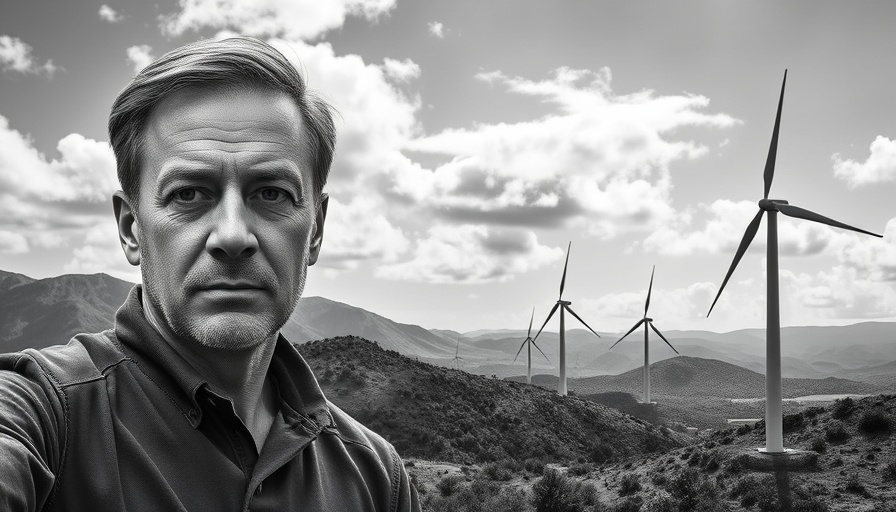
Litigation Sparks a New Chapter in Wind Energy Development
In an unprecedented move, a coalition of state attorneys general from 17 states and Washington, D.C., have banded together to challenge former President Donald Trump’s executive order aimed at halting the progress of wind energy projects. This legal action, initiated on May 5, 2025, seeks to overturn a directive that many believe could stifle not only clean energy advancements but also the economic futures of these states.
The Heart of the Matter: Economic and Environmental Stakes
The lawsuit posits that Trump's executive order is not just a policy disagreement but fundamentally questions the authority of a sitting president to unilaterally impede federal projects critical to the states' economic and environmental health. New York Attorney General Letitia James, spearheading the action, emphasizes the potential consequences of this order: “This arbitrary and unnecessary directive threatens the loss of thousands of good-paying jobs and billions in investments.” These sentiments echo across the coalition, unifying voices advocating for sustainable energy solutions that are essential for achieving state-level climate goals.
A Shift Toward Renewable Energy
Wind energy has historically faced risks of political backlash, yet its potential has never been more vital. The Biden administration had previously positioned offshore wind as a centerpiece of its climate initiatives, aiming for significant expansion in renewable energy infrastructure. By embracing this transition, many states have been able to set ambitious renewable energy targets, with an eye toward minimizing greenhouse gas emissions and fostering economic growth through green jobs.
Contrasting Energy Policies: A Tension Built on Ideology
The lawsuit reveals a stark contrast in energy policy ideologies, with Trump favoring traditional fossil fuel sources while the Biden administration pushes for expansive renewables like wind and solar. Trump’s assertion that his policies would reduce energy costs for Americans stands in opposition to the coalition’s focus on long-term investments in sustainable energy solutions that promise to curtail reliance on pollutive fossil fuels.
Legal Framework and Future Implications
This suit, filed in federal court in Massachusetts, raises significant questions not only about the legality of unilateral presidential powers but also about the future of environmental policy in the U.S. If successful, the coalition could reinvigorate the wind energy sector, fostering economic activity and job creation while advancing state-level climate initiatives. Conversely, if Trump's directives prevail, it may set a precedent for further hindrances against renewable energy projects.
Public Sentiment and Economic Realities
As this legal battle unfolds, public sentiment will play a crucial role. Many small business owners and ordinary citizens are advocating for cleaner energy solutions, recognizing that the transition to renewables is not just a matter of preference but a necessity for sustainable economic growth. The legal action has the potential to unite diverse stakeholders, including environmental groups, local businesses, and concerned citizens, all rallying against what they perceive as retrogressive energy policies.
Implications for Small Businesses
For consultants and small business owners, this situation illustrates the critical intersection of energy policy and economic opportunity. The stability and expansion of the wind energy sector can mean a resurgence of jobs, particularly in regions that have been historically reliant on fossil fuels. Entrepreneurs who align their operations with renewable energy initiatives stand to gain not only from new market opportunities but also by fostering a more sustainable future.
What Could Happen Next?
As the legal proceedings continue, it will be important for stakeholders to stay informed and engaged. Knowing how these developments will influence local economies, energy prices, and job creation can empower business leaders to make informed decisions in their strategies and operations.
In conclusion, the lawsuit against Trump's order represents more than just a legal challenge; it's a pivotal moment in the ongoing debate about America's energy future. As the coalition waits for a federal judge's ruling, the implications of this suit will undoubtedly ripple across the energy sector and serve as a reminder of the pressing need for sustainable solutions.
This saga also provides vital learnings for the business community on the importance of advocacy and engagement in policy matters. To harness opportunities in the shifting energy landscape, staying abreast of these developments is crucial.
 Add Row
Add Row  Add
Add 






Write A Comment